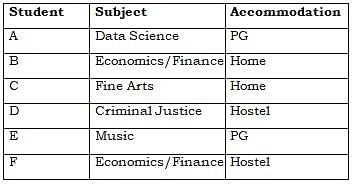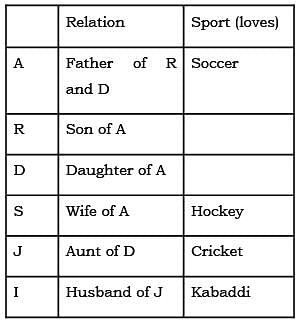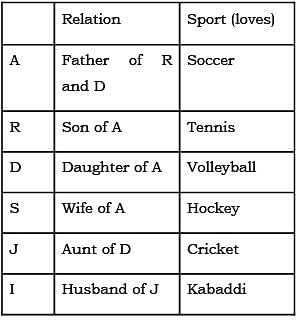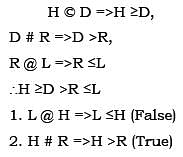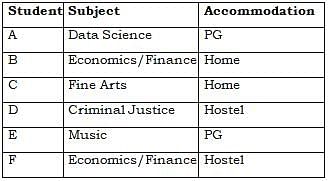APSC CCE Prelims (Paper 2) Mock Test - 4 - APSC CCE (Assam) MCQ
30 Questions MCQ Test APSC CCE Mock Test Series 2024 - APSC CCE Prelims (Paper 2) Mock Test - 4
Read the following information carefully and answer the questions that follow—
A, B, C, D, E and F are six students procuring their Master’s Degree in six different subjects—Data science, Finance, Criminal Justice, Fine arts, Economics and Music.
Two of them stay in hostel, two stay as paying guest (PG) and the remaining two stay at their home.
C does not stay as PG and studies Fine Arts.
The students studying Economics and Finance do not stay as PG.
E studies Music and D studies, Criminal Justice. F and D stay in Hostel. E stays as PG and B stays at home.
Q. Who studies Data science?
Two of them stay in hostel, two stay as paying guest (PG) and the remaining two stay at their home.
C does not stay as PG and studies Fine Arts.
The students studying Economics and Finance do not stay as PG.
E studies Music and D studies, Criminal Justice. F and D stay in Hostel. E stays as PG and B stays at home.
For some time, scientists have believed that cholesterol plays a major role in heart disease because people with familial hypercholesterolemia, a genetic defect, have six to eight times the normal level of cholesterol in their blood and they invariably develop heart disease. Scientists also noticed that people with familial hypercholesterolemia appear to produce more LDL’s (low-density lipoproteins) than normal individuals. However, scientists wondered, could a genetic mutation that causes a slowdown in the removal of LDL’s from the blood also result in an increase in the synthesis of this cholesterol-carrying protein? Since scientists could not experiment on human body tissue, their knowledge of familial hypercholesterolemia was severely limited. However, a breakthrough came in the laboratories of Yoshio Watanabe of Kobe University in Japan in 1980. Watanabe noticed that a male rabbit in his colony had ten times the normal concentration of cholesterol in its blood. By appropriate breeding, Watanabe obtained a strain of rabbits that had very high cholesterol levels. These rabbits spontaneously developed heart disease. To his surprise, Watanabe further found that the rabbits, like humans with familial hypercholesterolemia, lacked LDL receptors. What scientists learned by studying the Watanabe rabbits is that the removal of the VLDL (very low-density lipoproteins) remnant requires the LDL receptor. Normally, the majority of the VLDL remnants go to the liver where they bind to LDL receptors and are degraded. In the Watanabe rabbit, due to a lack of LDL receptors on liver cells, the VLDL remnants remain in the blood and are eventually converted to LDL’s. The LDL receptors thus have a dual effect in controlling LDL levels. They are necessary to prevent over synthesis of LDL’s from VLDL remnants and they are necessary for the normal removal of LDL’s from the blood.
Q. The passage implies that Watanabe rabbits differ from normal rabbits in which of the following ways?
| 1 Crore+ students have signed up on EduRev. Have you? Download the App |
The Bombay High Court stumped India’s most powerful sporting body, BCCI, by ordering it to move the cash cow IPL out of the drought-stricken Maharashtra. The court orders struck a chord among many, including die-hard cricket fans. The stark contrast between parched lands and dry throats of rural and semi-urban Maharashtra and the manufactured euphoria around water-guzzling cricket pitches did shake people’s conscience. The arguments in the court captured the latent and at times, simmering unease in the public mind over the degeneration of cricket from a sport to a money-spinner and worse.
Moreover, cricket, another colonial gift, had become the de facto national sport, crushing hockey and all other sports under its pitch rollers. On top of it, the mighty cricket board, perceived to be a hub of myriad commercial and political vested interests, became a law unto itself.
Q. Why does the author mean by referring cricket as the ‘de facto national sport’ in the passage?
Consider the following and answer the question based on it.
Aayush’s playing schedule consists of Cricket, Hockey, Soccer, Tennis, and Volleyball from Monday to Saturday; each game is on one day, one day being a rest day.
Cricket is played neither on the first day nor on last day but is played earlier than Tennis.
Volleyball is played on the immediate next day of the tennis day.
Hockey is played on the immediate previous day of the rest day.
Volleyball and Soccer were played with a 2-day gap between them.
Soccer is played on the day following the rest day.
Q. Which of the following is a correct statement?
The great Acharyas have said that having discovered a great goal, surrender yourself to that goal and act towards it drawing your inspiration from that goal whereby you will get a new column of energy. Do not allow this energy to the dissipated in the futile memories of past regrets or failures, nor in the excitement of the present. And thus, bring that entire energy focussed into activity. That is the highest creative action in the world outside. Thereby the individual who is still now considered most inefficient finds his way to the highest achievement and success. This is said very easily in a second. But in order to train our mind to this attitude, it needs considerable training because we have already trained the mind wrongly to such an extent that we have become perfect in imperfections. Not knowing the art of action, we have been master artists in doing the wrong thing. The totality of activity will bring the country to a wrong end indeed.
If each one is given a car to achieve an ideal socialistic pattern and nobody knows driving but everybody starts driving, what would be the condition on the road? Everybody has equal right on the public road. Then each car must necessarily dash against the other, and there is bound to be a jumble. This seems to be the very apt pattern of life that we are heading to. Every one of us is a vehicle. We know how to go forward. The point is, intellect is very powerful and everyone is driving but nobody seems to know how to control the mental energy and direct it properly or guide it to the proper destination.
Q. The author’s chief concern is
Directions: These questions are based on the following pie-charts.
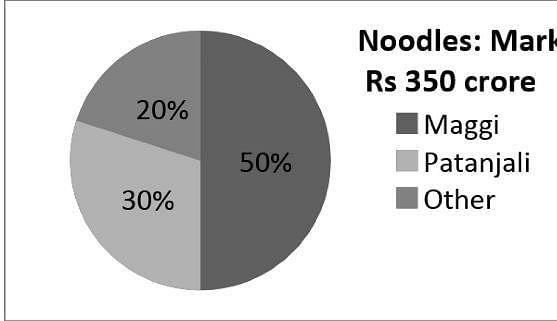
Cheese: Market size 120 crore
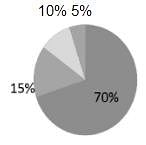
- Amul
- Vadilal
- Mother Dairy
- Other
Q. If Maggi produces Superior and Ordinary types of its products - noodles and ketchup - in the ratio of 3 : 2 and 7 : 3 respectively, find the total market share (in Rupees crore) of the Ordinary type of products of Maggi.
"I want to criticize the social system, and to show it at work, at its most intense." Virginia Woolf’s provocative statement about her intentions in writing Mrs. Dalloway has regularly been ignored by the critics, since it highlights an aspect of her literary interests very different from the traditional picture of the "poetic” novelist concerned with examining states of reverie and vision and with following the intricate pathways of individual consciousness. In her novels, Woolf is deeply engaged by the questions of how individuals are shaped (or
deformed) by their social environments, how historical forces impinge on people’s lives, how class, wealth, and gender help to determine people’s fates. Most of her novels are rooted in a realistically rendered social setting and in a precise historical time.Woolf’s focus on society has not been generally recognized because of her intense antipathy to propaganda in art. The pictures of reformers in her novels are usually satiric or sharply critical.Woolf detested what she called "preaching" in fiction, too, and criticized novelist D. H. Lawrence (among others) for working by this method. Woolf’s own social criticism is expressed in the language of observation rather than in direct commentary, since for her, fiction is a contemplative, not an active art. Woolf’s literary models were acute social observers like Chekhov and Chaucer. As she put it in The Common Reader, "It is safe to say that not a single law has been framed or one stone set upon another because of anything Chaucer said or wrote; and yet, as we read him, we are absorbing morality at every pore."
Q. It can be inferred from the passage that the most probable reason Woolf realistically described the social setting in the majority of her novels was that she
Directions: These questions are based on the following pie-charts.

Cheese: Market size 120 crore

- Amul
- Vadilal
- Mother Dairy
- Other
Q. If Maggi produces Superior and Ordinary types of its products - there ratio is 2 : 3 respectively, find the total market share (in Rupees crore) of the Ordinary type of products of Maggi.
One-third of Mayank’s marks in history equals his marks in geography. If he obtained 180 marks in two subjects together, how much marks did he get in geography?
Direction: A, R, D, S, J and I are 6 members of a family. There are two couples. Each loves a sport namely soccer, cricket, volleyball, tennis, hockey and kabaddi. A who loves soccer is father of R who does not loves volleyball and married to a woman who loves hockey, S is sister of J who loves cricket. D, the only daughter of A and her maternal Aunt J’s husband is I who loves kabaddi.
Q. which sport R loves?
One-way governments can decrease air pollution is to impose a tax on industrial carbon dioxide emissions. It is not clear how high taxes imposed on carbon dioxide emissions should be or what its economic and environmental implications would be. At first glance, it is not difficult to estimate roughly the size of the tax needed to effect a given level of emission reduction. One writer estimate, for example, that a tax of 41 percent on the price of coal, 33 percent on oil, and 25 percent on gas would reduce the United Kingdom’s emissions by 20 percent (using 1988as the base year) by the year 2005, the target recommended by the 1988 Toronto Conference. These numbers are based on the assumption that all countries will behave cooperatively in imposing a carbon tax.
Q. According to the passage, the size of the carbon tax levied on a given fuel would vary with the
Directions: Symbols @, %, #, $, ©
are used with different meanings as explained below:
‘P @ Q’ means ‘P is not greater than Q’.
‘P % Q’ means ‘P is neither greater than nor equal to Q’.
‘P # Q’ means ‘P is neither smaller than nor equal to Q’.
‘P $ Q’ means ‘P is neither smaller than nor greater than Q’.
‘P © Q’ means ‘P is not smaller than Q’.
Three statements showing relationships have been given, which are followed by two conclusions (1) and (2). Assuming that the given statements are true, find out which conclusions(s) is/are definitely true.
Q. Statements—H © D, D # R, R @ L. Conclusions—
L @ H
H # R
Directions: Study the following information carefully and answer the questions below.
A team of five is to be selected from amongst five boys A, B, C, D and E and four girls P, Q, R and S. Some criteria for selection are—
A and S have to be together
P cannot be put with R
D and Q cannot go together
C and E have to be together
R cannot be put with B
Unless otherwise stated, these criteria are applicable to all questions below.
Q. If two of the members are girls and D is one of the members, the members of the team other than D are—
Bigotry and racism are among the deadliest social ills plaguing the world today, but, unlike a team of costumed super-villains, they can’t be halted with a punch in the snoot or a zap from a ray gun. The only way to destroy them is to expose them - to reveal them for the insidious evils they really are. The bigot is an unreasoning hater - one who hates blindly, fanatically,
indiscriminately. If his hang-up is black men, he hates ALL black men. If a redhead once offended him, he hates ALL redheads. If some foreigner beat him to a job, he’s down on ALL foreigners. He hates people he’s never seen - people he’s never known - with equality intensity - with equal venom. Now, we’re not trying to say it’s
unreasonable for one human being to bug another. But, although anyone has the right to dislike another individual, it’s totally irrational, patently insane to condemn an entire race - to despise an entire nation - to vilify an entire religion. Sooner or later, we must learn to judge each other on our own merits. Sooner or later, if man is ever to be worthy of his destiny, we must fill our hearts with tolerance. For then, and only then, will we be truly worthy of the concept that man was created in the image of God - a God who calls us ALL - His children. Pax et Justitia
Q. According to the author, what is the way to halt Bigots?
One-way governments can decrease air pollution is to impose a tax on industrial carbon dioxide emissions. But why should governments consider a carbon tax when they could control emissions by establishing energy efficiency and conservation standards, by legislating against coal use, or by increasing investment in nuclear? The great virtue of such a tax is that it would provide incentives for industry to achieve emission reductions. Because oil emits more carbon dioxide per unit of energy generated than does natural gas, and coal more than oil, a carbon tax would vary with the type of fuel. Such a tax would induce industry to substitute less-polluting fuels for those carrying a higher tax and also to reduce the total use of energy.
Q. Which one of the following circumstances would most seriously undermine the conclusion “Such a tax would induce industry to substitute less- polluting fuels for those carrying a higher tax”
Directions: Read the following information carefully and answer the questions that follow—
Five plays A, B, C, D and E are to be staged from Monday to Friday of a week. On each day, only one play will be staged. D or E should not be either the first or last to be staged. E should be immediately followed by C. B should be staged immediately after D. One play is staged between A and B.
Q. Which is the first play to be staged?
Directions: Read the following information carefully and answer the questions that follow—
Five plays A, B, C, D and E are to be staged from Monday to Friday of a week. On each day, only one play will be staged. D or E should not be either the first or last to be staged. E should be immediately followed by C. B should be staged immediately after D. One play is staged between A and B.
Q. Which play was staged on Wednesday?
Direction: In a world cup tournament 16 teams participated. These 16 teams are seeded from 1 to 16 with seed 1 being the top seed and seed 16 being the bottom seed. The tournament is conducted in different stages. In stage 1 seed 1 played with seed 16 and that match is named as match 1 of stage 1, seed 2 played with seed 15 and that match is named as match 2 of stage 1, and so on. In stage 2, winner of match 1 and match 8 of stage 1 played against each other and that match is named as Match 1 of stage 2, then winner of match 2 and match 7 of stage 1 played against each other and that match is named as Match 2 of stage 2. And so on The same procedure is followed in further stages. Now answer the following questions.
Q. How many stages are in the tournament?
"Popular art" has a number of meanings, impossible to define with any precision, which range from folklore to junk. The poles are clear enough, but the middle tends to blur. The Hollywood Western of the 1930‘s, for example, has elements of folklore, but is closer to junk than to high art or folk art. The case of Giuseppe Verdi is an interesting one: he took a popular genre, bourgeois melodrama set to music and, without altering its fundamental nature, transmuted it into high art. This remains one of the greatest achievements in music, and one that cannot be fully appreciated without recognizing the essential trashiness of the genre. As an example of such a transmutation, consider what Verdi made of the typical political elements of nineteenth-century opera. Generally, in the plots of these operas, a hero or heroine— usually portrayed only as an individual, unfettered by class—is caught between the immoral corruption of the aristocracy and the doctrinaire rigidity or secret greed of the leaders of the proletariat. Verdi transforms this naive and unlikely formulation with music of extraordinary energy and rhythmic vitality, music more subtle than it seems at first hearing. There are scenes and arias that still sound like calls to arms and were clearly understood as such when they were first performed. Such pieces lend an immediacy to the otherwise veiled political message of these operas and call up feelings beyond those of the opera itself. Or consider Verdi’s treatment of character. Before Verdi, there were rarely any characters at all in musical drama, only a series of situations which allowed the singers to express a series of emotional states. Any attempt to find coherent psychological portrayal in these operas is misplaced ingenuity. The only coherence was the singer’s vocal technique.
Q. According to the passage, the immediacy of the political message in Verdi’s operas stems from the
Statement: Most of those who study in premier medical colleges in India migrate to Russia for better prospects in their professional pursuits.
Courses of Action:
All the students joining these colleges should be asked to sign a bond at the time of admission to the effect that they will remain in India at least for ten years after they complete education.
All those students who desire to settle in Russia should be asked to pay entire cost of their education which the government subsidies.
The main benefit to the economy from an active stock market is the ready availability of risk capital for investment in equities through the primary market. For that risk capital be readily available. Investors need to have an easy exit route. A liquid secondary market provides an easy exit route through the active involvement of buyers and sellers. It does not matter whether these buyers and sellers have short or long term investment horizons. Liquidity in the market is enhanced by leveraged players who either borrow to play the market or achieve a similar result through futures contracts whose economic value includes financing costs. Short sellers confer a similar benefit by borrowing stock or achieving the same result through futures contracts.
Q. Which of the following inference(s) is/are definitely true?
There are distinct phases of outside help to end a conflict. In the first phase focus is on providing food, water, shelter and medicine to refugees, i.e., humanitarian. In the second, emphasis is on the refugees returning home while in the last phase long-term investments and strengthening of courts is the main focus. However, once a conflict is over, aid agencies sanctioned by the World Bank send study groups instead of requisite personnel. There is a gap of several years before moving from humanitarian relief arrives the war has restarted. It is possible to restart economic development through targeted "quick impact" initiatives. Most economies in post conflict countries are based on agriculture. Providing free packages of seeds, fertilizers and low-cost equipment quickly will ensure that former soldiers will return to their farms and establish their livelihood. But the window of opportunity closes quickly and
one has to implement these measures almost immediately.
Q. What is the benefit of "quick impact" aid?
Read the following information carefully and answer the questions that follow—
A, B, C, D, E and F are six students procuring their Master’s Degree in six different subjects—Data science, Finance, Criminal Justice, Fine arts, Economics and Music.
Two of them stay in hostel, two stay as paying guest (PG) and the remaining two stay at their home.
C does not stay as PG and studies Fine Arts.
The students studying Economics and Finance do not stay as PG.
E studies Music and D studies, Criminal Justice. F and D stay in Hostel. E stays as PG and B stays at home.
Q. Which of the following pairs of students stay one each at hostel and at home?
It has long been known that the rate of oxidative metabolism (the process that uses oxygen to convert food into energy) in any animal has a profound effect on its living patterns. The high metabolic rate of small animals, for example, gives them sustained power and activity per unit of weight, but at the cost of requiring constant consumption of food and water. Very large animals, with their relatively low metabolic rates, can survive well on a sporadic food supply, but can generate little metabolic energy per gram of body weight. If only oxidative metabolic rate is considered, therefore, one might assume that smaller, more active, animals could prey on larger ones, at least if they attacked in groups. Perhaps they could if it were not for anaerobic glycolysis, the great equalizer. Anaerobic glycolysis is a process in which energy is produced, without oxygen, through the breakdown of muscle glycogen into lactic acid and adenosine triphosphate (ATP), the energy provider. The amount of energy that can be produced anaerobically is a function of the amount of glycogen present—in all vertebrates about 0.5 percent of their muscle’s weight. Thus, the anaerobic energy reserves of a vertebrate are proportional to the size of the animal. If, for example, some predators had attacked a 100-ton dinosaur, normally torpid, the dinosaur would have been able to generate almost instantaneously, via anaerobic glycolysis, the energy of 3,000 humans at maximum oxidative metabolic energy production. This explains how many large species have managed to compete with their more active neighbours: the compensation for a low oxidative metabolic rate is glycolysis.
Q. The author suggests that, on the basis of energy production, a 100-ton dinosaur would have been markedly vulnerable to which of the following?
Repeated attacks by a single smaller, more active adversary
Sustained attack by numerous smaller, more active adversaries
An attack by an individual adversary of similar size
The great Acharyas have said that having discovered a great goal, surrender yourself to that goal and act towards it drawing your inspiration from that goal whereby you will get a new column of energy. Do not allow this energy to the dissipated in the futile memories of past regrets or failures, nor in the excitement of the present. And thus, bring that entire energy focussed into activity. That is the highest creative action in the world outside. Thereby the individual who is still now considered most inefficient finds his way to the highest achievement and success. This is said very easily in a second. But in order to train our mind to this attitude, it needs considerable training because we have already trained the mind wrongly to such an extent that we have become perfect in imperfections. Not knowing the art of action, we have been master artists in doing the wrong thing. The totality of activity will bring the country to a wrong end indeed.
If each one is given a car to achieve an ideal socialistic pattern and nobody knows driving but everybody starts driving, what would be the condition on the road? Everybody has equal right on the public road. Then each car must necessarily dash against the other, and there is bound to be a jumble. This seems to be the very apt pattern of life that we are heading to. Every one of us is a vehicle. We know how to go forward. The point is, intellect is very powerful and everyone is driving but nobody seems to know how to control the mental energy and direct it properly or guide it to the proper destination.
Q. Which of the following could lead to success?
The Bombay High Court stumped India’s most powerful sporting body, BCCI, by ordering it to move the cash cow IPL out of the drought-stricken Maharashtra. The court orders struck a chord among many, including die-hard cricket fans. The stark contrast between parched lands and dry throats of rural and semi-urban Maharashtra and the manufactured euphoria around water-guzzling cricket pitches did shake people’s conscience. The arguments in the court captured the latent and at times, simmering unease in the public mind over the degeneration of cricket from a sport to a money-spinner and worse.
Moreover, cricket, another colonial gift, had become the de facto national sport, crushing hockey and all other sports under its pitch rollers. On top of it, the mighty cricket board, perceived to be a hub of myriad commercial and political vested interests, became a law unto itself.
Q. What does the term ‘cash cow’ mean in the passage?
Directions : Study the following information carefully and answer the questions below.
A team of five is to be selected from amongst five boys A, B, C, D and E and four girls P, Q, R and S. Some criteria for selection are—
A and S have to be together
P cannot be put with R
D and Q cannot go together
C and E have to be together
R cannot be put with B
Unless otherwise stated, these criteria are applicable to all questions below.
Q. If A and C are the members, the other members of the team cannot be—
Bigotry and racism are among the deadliest social ills plaguing the world today, but, unlike a team of costumed super-villains, they can’t be halted with a punch in the snoot or a zap from a ray gun. The only way to destroy them is to expose them - to reveal them for the insidious evils they really are. The bigot is an unreasoning hater - one who hates blindly, fanatically,
indiscriminately. If his hang-up is black men, he hates ALL black men. If a redhead once offended him, he hates ALL redheads. If some foreigner beat him to a job, he’s down on ALL foreigners. He hates people he’s never seen - people he’s never known - with equality intensity - with equal venom. Now, we’re not trying to say it’s
unreasonable for one human being to bug another. But, although anyone has the right to dislike another individual, it’s totally irrational, patently insane to condemn an entire race - to despise an entire nation - to vilify an entire religion. Sooner or later, we must learn to judge each other on our own merits. Sooner or later, if man is ever to be worthy of his destiny, we must fill our hearts with tolerance. For then, and only then, will we be truly worthy of the concept that man was created in the image of God - a God who calls us ALL - His children. Pax et Justitia
Q. According to the author, Radicals hate which type of person?
It has long been known that the rate of oxidative metabolism (the process that uses oxygen to convert food into energy) in any animal has a profound effect on its living patterns. The high metabolic rate of small animals, for example, gives them sustained power and activity per unit of weight, but at the cost of requiring constant consumption of food and water. Very large animals, with their relatively low metabolic rates, can survive well on a sporadic food supply, but can generate little metabolic energy per gram of body weight. If only oxidative metabolic rate is considered, therefore, one might assume that smaller, more active, animals could prey on larger ones, at least if they attacked in groups. Perhaps they could if it were not for anaerobic glycolysis, the great equalizer. Anaerobic glycolysis is a process in which energy is produced, without oxygen, through the breakdown of muscle glycogen into lactic acid and adenosine triphosphate (ATP), the energy provider. The amount of energy that can be produced anaerobically is a function of the amount of glycogen present—in all vertebrates about 0.5 percent of their muscle’s weight. Thus, the anaerobic energy reserves of a vertebrate are proportional to the size of the animal. If, for example, some predators had attacked a 100-ton dinosaur, normally torpid, the dinosaur would have been able to generate almost instantaneously, via anaerobic glycolysis, the energy of 3,000 humans at maximum oxidative metabolic energy production. This explains how many large species have managed to compete with their more active neighbours: the compensation for a low oxidative metabolic rate is glycolysis.
Q. The passage suggests that the total anaerobic energy reserves of a vertebrate are proportional to the vertebrate’s size because
Consider the following and answer the question based on it.
Aayush’s playing schedule consists of Cricket, Hockey, Soccer, Tennis, and Volleyball from Monday to Saturday; each game is on one day, one day being a rest day.
Cricket is played neither on the first day nor on last day but is played earlier than Tennis.
Volleyball is played on the immediate next day of the tennis day.
Hockey is played on the immediate previous day of the rest day.
Volleyball and Soccer were played with a 2-day gap between them.
Soccer is played on the day following the rest day.
Q. On which day is soccer played?


